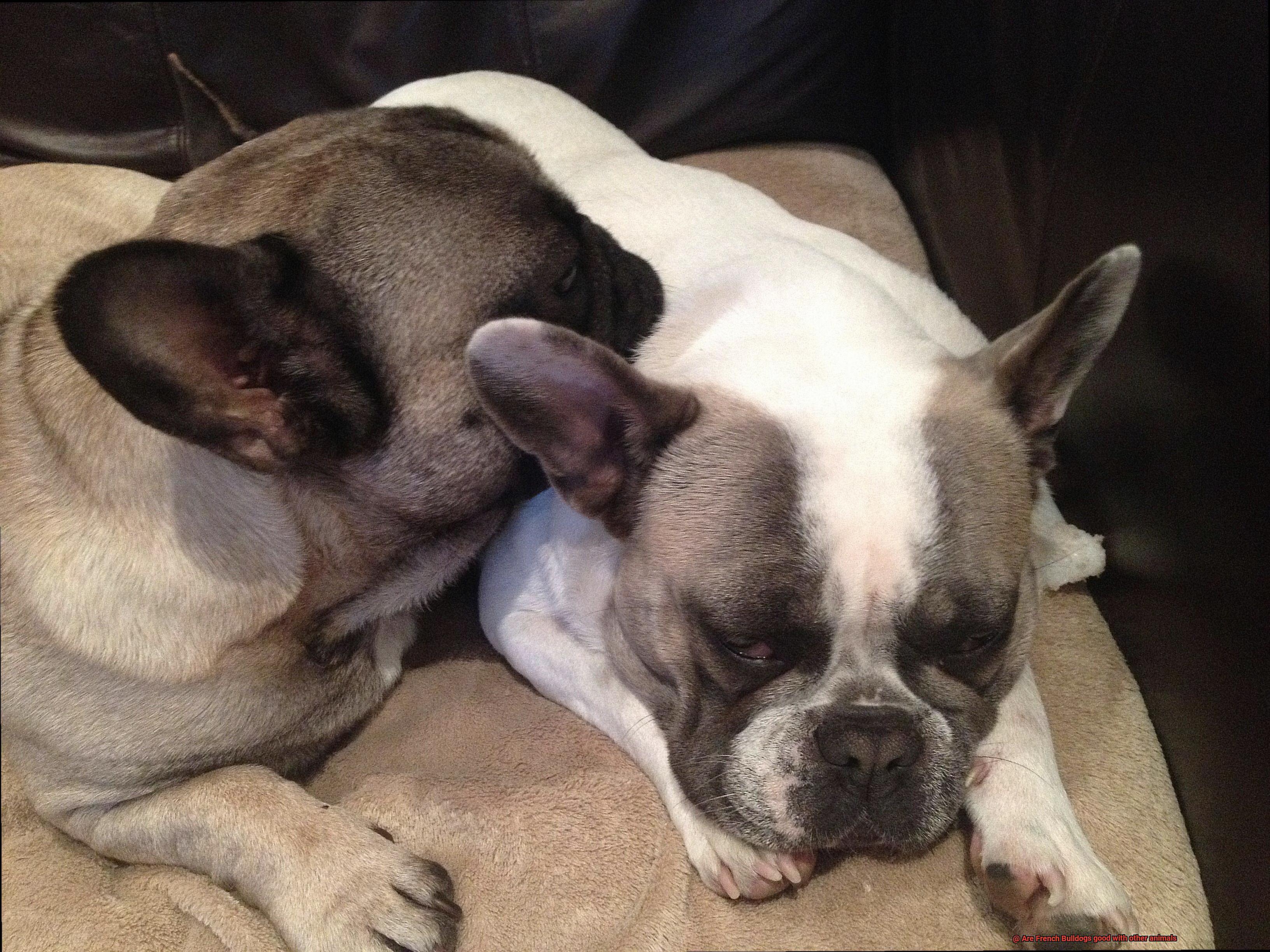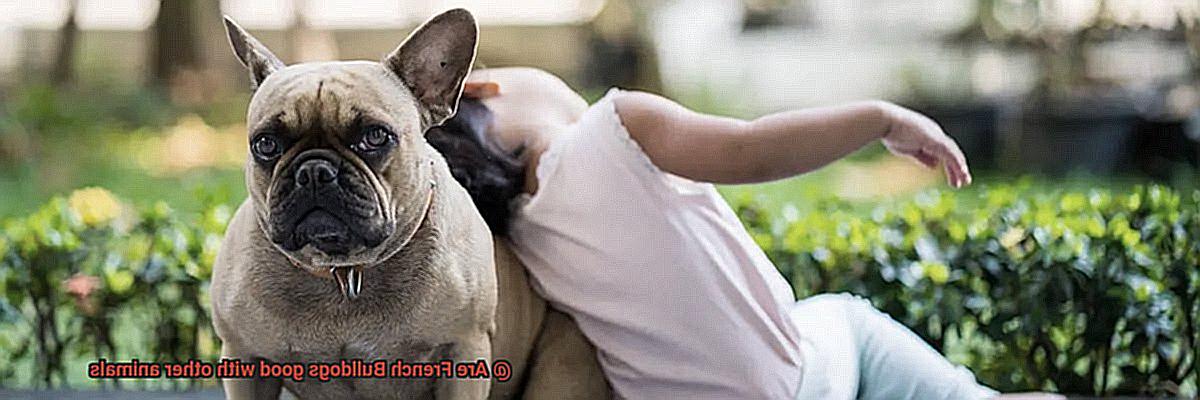Are French Bulldogs good with other animals?
Adding a French Bulldog to your family is an exciting decision, but what about their compatibility with your existing pets? It’s a common concern for those looking to expand their furry clan. With their unique looks, charming personalities, and undeniable cuteness, French Bulldogs have become increasingly popular as companions. But before you take the plunge, it’s crucial to understand how well they get along with other animals.
In this blog post, we’ll explore the fascinating world of French Bulldogs’ interactions with fellow pets. We’ll uncover their adaptability and social skills when it comes to dogs, cats, and smaller critters. By understanding the factors that influence their compatibility, we aim to provide valuable insights that will help you make informed decisions about introducing a French Bulldog into your multi-pet household.

Whether you already have pets at home or are considering adopting a French Bulldog alongside other animals, this comprehensive guide is here to unravel the truth about these adorable canines’ compatibility. We’ll shed light on potential challenges while offering practical solutions for harmonious coexistence.
So let’s dive into the captivating world of French Bulldogs and their interactions with other animals. Join us as we explore expert advice and real-life experiences that will guide you in creating a harmonious pet paradise.
Are French Bulldogs good with other animals
Contents
- 1 Are French Bulldogs good with other animals
- 2 What Makes French Bulldogs Good with Other Animals?
- 3 Introducing French Bulldogs to Other Animals
- 4 Socializing French Bulldogs with Other Animals
- 5 Monitoring Interactions between French Bulldogs and Other Animals
- 6 Prey Drive in French Bulldogs Towards Smaller Animals
- 7 Training as a Key Component of Building Positive Relationships Between French Bulldogs and Other Pets
- 8 Considering Individual Personalities When Determining Compatibility Between French Bulldogs and Other Pets
- 9 Introducing a New Pet into a Home with an Existing Pet
- 10 Conclusion
French Bulldogs are not only adorable and lovable companions, but they also have a knack for forming successful relationships with other animals. Their friendly and sociable nature makes them a great addition to multi-pet households. In this blog post, we’ll explore how French Bulldogs can establish harmonious connections with other animals and provide tips on introducing them to their furry counterparts.
The Friendly and Tolerant Nature:
French Bulldogs are known for their calm and easygoing demeanor, which often helps them get along with other animals. They have a natural affinity for socializing, making them suitable companions for dogs, cats, and even smaller pets like rabbits or guinea pigs. Their friendly and tolerant nature allows them to adapt well to multi-pet households, making them an excellent choice for families with multiple animals.
Proper Introductions:
Introducing a French Bulldog to another animal should be done gradually and in a controlled environment. Start by allowing them to sniff each other from a distance while closely observing their reactions. If both animals appear calm and relaxed, you can proceed with supervised interactions. Remember, patience is key during this process.
Early Socialization:
Proper socialization from an early age is crucial in ensuring that French Bulldogs develop good relationships with other animals. Exposing them to different animals and situations during their puppyhood will help them become more comfortable and adaptable in the presence of other animals. Positive reinforcement and rewards for appropriate behavior towards other animals can go a long way in fostering healthy relationships.
Factors to Consider:
While French Bulldogs generally have a friendly demeanor, it’s important to consider individual temperament when introducing them to other animals. Some dogs or cats may have dominant or territorial tendencies that could lead to conflicts or tension. Assessing the temperament of both animals before introductions is crucial.
Supervision and Safety:
French Bulldogs are relatively small in size, so it’s essential to supervise interactions with larger animals to prevent accidents or injuries. Additionally, some French Bulldogs may have a prey drive towards smaller animals like birds or rodents. Always monitor their interactions to ensure everyone’s safety and well-being.
Conclusion:
French Bulldogs’ friendly and sociable nature makes them generally good with other animals, making them a great addition to multi-pet households. Proper introductions, early socialization, and supervision are key to building successful relationships between French Bulldogs and other animals. With the right approach, your French Bulldog can become a social butterfly, bringing joy and companionship to all members of your furry family.
What Makes French Bulldogs Good with Other Animals?
French Bulldogs are known for their friendly and sociable nature, making them excellent companions for other animals. Their calm and easy-going temperament, adaptability, tolerance, intelligence, strong desire for companionship, and size all contribute to their compatibility with other pets.
- Adaptability: French Bulldogs have a remarkable ability to adjust to new environments and situations. This adaptability extends to interacting with other animals. Whether it’s a new furry friend or a feathery companion, French Bulldogs can quickly adapt and form positive relationships.
- Tolerance and Patience: French Bulldogs possess a remarkable level of tolerance and patience. They can handle the playful antics of other animals without getting irritated or aggressive. This makes them ideal companions for energetic or boisterous pets.
- Intelligence: French Bulldogs are intelligent dogs that quickly learn and understand social cues and body language. This enables them to communicate effectively with other pets, avoiding misunderstandings and potential conflicts.
- Desire for Companionship: French Bulldogs have a strong desire for companionship, both from humans and other animals. They thrive in a social environment and enjoy the company of other pets. Their affectionate nature makes them seek out interactions and form bonds with other animals.
- Size: Being a small to medium-sized breed, French Bulldogs are less intimidating to larger animals. This helps prevent conflicts or dominance issues when interacting with animals of different sizes.
- Proper Socialization: Proper socialization from a young age is crucial in ensuring that French Bulldogs develop good relationships with other animals. Early exposure to different species and positive experiences can help them become more accepting and friendly towards other pets.
- Individual Personalities: It’s important to note that individual personalities can vary among French Bulldogs, just like any other breed. While most French Bulldogs tend to be good with other animals, there may be exceptions. Assessing each dog’s temperament and behavior on an individual basis is essential before introducing them to new animal companions.
Introducing French Bulldogs to Other Animals
You’ve got a French Bulldog and you’re ready to expand your furry family. Whether you’re bringing home a new cat, dog, or even a hamster, it’s crucial to approach the introduction process with caution and patience. After all, we want our Frenchie to make friends, not enemies. Here’s how to do it:
Slow and Steady Wins the Race:
When introducing your French Bulldog to another animal, take it slow and steady. Start by allowing them to sniff each other from a distance. This is like a canine handshake – a way for them to say “hello” without getting all up in each other’s business. As they become more comfortable, gradually decrease the distance between them.
Treats, Praise, and All That Jazz:
Positive reinforcement is key when it comes to introducing your French Bulldog to other animals. Reward your Frenchie with treats and praise for calm and friendly behavior. This creates positive associations with the presence of the other animal. And don’t forget to reward the other animal too. Positive vibes all around.
Super(dog)vision Required:
Keep a close eye on any interactions between your Frenchie and the other animal. Supervision is crucial, especially during those initial stages of introduction. If you spot any signs of aggression or discomfort, step in and redirect their attention. Safety first, furriends.
The Power of Scent:
Before face-to-face introductions, let your Frenchie and the other animal become familiar with each other’s scent. Swap bedding or toys between them so they can get a whiff of each other before their big meet-and-greet. It’s like a sneak peek before the real deal.
Take It One Paw at a Time:
Remember, slow and steady wins the race. Gradual exposure is key when introducing your French Bulldog to other animals. Start with short and controlled encounters, gradually increasing the duration as they become more comfortable with each other. We’re building trust here, folks.
Calling in the Pros:
If you’re feeling unsure or if your Frenchie’s behavior is giving you paws, don’t hesitate to seek professional help. A dog trainer or behaviorist can provide personalized guidance and strategies for a successful introduction. They’ll have your Frenchie making friends in no time.
Socializing French Bulldogs with Other Animals
When it comes to socializing your French Bulldog with other animals, taking a paw-sitive approach is key. Early socialization, supervised introductions, and positive reinforcement are crucial in ensuring a harmonious relationship between your Frenchie and other furry friends. In this article, we’ll explore some expert tips and strategies to help you navigate the socialization process and create a bond that will last a lifetime.
Start Early, Start Right:
Early socialization is essential for French Bulldogs to develop positive associations with other animals. Begin the process as early as possible, ideally during their puppyhood. Expose them to a variety of animals, such as cats, dogs, and smaller pets, in controlled environments to help them become confident and adaptable.
Take It Slow:
Supervised introductions are vital to ensure the safety of both your Frenchie and the other animals. Start with short and positive interactions, gradually increasing the duration as they become more comfortable with each other. Keep a watchful eye for any signs of aggression or fear and intervene if necessary.
Positive Reinforcement:
Positive reinforcement plays a significant role in shaping your Frenchie’s behavior towards other animals. Use treats, praise, and toys to reward calmness, friendly approaches, and good manners during interactions. This helps create positive associations and encourages your Frenchie to seek out more furry playdates in the future.
Respect Individual Differences:
Just like humans, every French Bulldog has its own unique personality and temperament. Respect their individual differences and adjust the socialization process accordingly. Some may be naturally sociable, while others may require extra support or guidance. Tailor your approach to their needs.
Gradual Exposure:
Gradually expose your Frenchie to various animals in different environments. Start with familiar animals within the household, then introduce them to new animals in neutral territories. This allows your Frenchie to become accustomed to different scents, behaviors, and body language, reducing the likelihood of fear or aggression.
Seek Professional Help:
If you’re unsure about how to properly socialize your French Bulldog with other animals, don’t hesitate to seek guidance from a professional dog trainer or behaviorist. They can provide expert advice, tailored strategies, and hands-on assistance to ensure a successful integration.
Monitoring Interactions between French Bulldogs and Other Animals
French Bulldogs are known for their friendly and sociable nature, making them great companions for both humans and other animals. However, it is important to monitor their interactions with other animals to ensure their safety and the well-being of everyone involved. In this blog post, we will explore the importance of monitoring these interactions, provide tips on introducing French Bulldogs to other animals, and discuss the role of training and socialization in creating a positive environment for all.
Importance of Monitoring Interactions:
Safety First:
Monitoring interactions between French Bulldogs and other animals is crucial to prevent any potential conflicts or aggression. By observing their behavior closely, you can quickly intervene if any signs of discomfort or aggression arise.
Prey Drive Considerations:
Some French Bulldogs may have a prey drive, which means they may have a natural instinct to chase or hunt smaller animals. By monitoring their interactions, you can take necessary precautions when introducing them to cats or smaller pets.
Tips for Introducing French Bulldogs to Other Animals:
Controlled Environment:
Introduce your French Bulldog to other animals in a controlled and supervised environment. This ensures that you can manage the interaction and step in if needed.
Slow and Steady:
Take things slow when introducing your French Bulldog to a new animal. Allow them to sniff each other from a distance and gradually decrease the distance between them. This helps them get acquainted at their own pace.
Observe Body Language:
Pay attention to the body language of both your French Bulldog and the other animal during their interactions. Raised hackles, growling, or lunging may indicate discomfort or aggression. Interrupt the interaction if necessary.
The Role of Training and Socialization:
Training for Appropriate Behavior:
Proper training plays a crucial role in ensuring that your French Bulldog interacts well with other animals. Teach them commands and reinforce positive behavior to promote good manners.
Socialization for Comfort:
Socialize your French Bulldog by exposing them to different types of animals. This helps them become more comfortable in the presence of other animals, reducing the chances of aggression or fear.
Prey Drive in French Bulldogs Towards Smaller Animals
French Bulldogs are generally known for their friendly and sociable nature, but it’s important to be aware that some individuals may exhibit a prey drive towards smaller animals. Prey drive refers to the instinctive desire to chase and capture smaller animals like squirrels, rabbits, or even smaller pets like birds or hamsters.
Here are some key points to understand about prey drive in French Bulldogs and measures owners can take to reduce this behavior:
- Training: Positive reinforcement training methods can be used to teach French Bulldogs appropriate behaviors and redirect their attention away from chasing smaller animals. Rewarding them for calm behavior and teaching them commands like “leave it” or “stay” can help manage their prey drive.
- Socialization: Early socialization is crucial in helping French Bulldogs develop positive relationships with other animals. Exposing them to different animals and teaching them how to interact calmly and respectfully can help reduce any potential prey drive tendencies.
- Supervision: When introducing French Bulldogs to smaller animals, it’s important to closely supervise their interactions. Keeping them on a leash or in a secure area can prevent any unwanted incidents until their behavior can be reliably assessed.
- Professional guidance: If a French Bulldog consistently displays a strong prey drive or aggressive behavior towards smaller animals, it may be necessary to consult with a professional dog trainer or behaviorist for further guidance. They can provide personalized advice and develop a training plan tailored to the individual dog’s needs.
- Individual temperament: It’s important for owners to understand their French Bulldog’s individual temperament and behavior around other animals. While French Bulldogs generally have a lower prey drive, there may be exceptions. Being observant and proactive can help prevent any potential conflicts.
Remember, every dog is unique, and while French Bulldogs generally have a lower prey drive, it’s crucial for owners to be vigilant, provide appropriate training and socialization, and take necessary precautions to ensure the safety and well-being of all animals involved.
Training as a Key Component of Building Positive Relationships Between French Bulldogs and Other Pets
French Bulldogs are known for their friendly and sociable nature, but like any other breed, they require proper training to build positive relationships with other pets. Training not only helps to establish good behavior and manners, but it also teaches French Bulldogs how to interact appropriately with other animals.
In this blog post, we will explore why training is essential and provide tips on how to train your French Bulldog for successful interactions with other pets.
Starting Early:
Training should begin as early as possible to ensure that your French Bulldog understands what is expected of them when interacting with other animals. It is during their formative months that they are most receptive to learning. Basic obedience commands such as sit, stay, and come are crucial for controlling a French Bulldog’s behavior around other pets.
Positive Reinforcement:
Positive reinforcement techniques, such as using treats or praise, are highly effective in training French Bulldogs and encouraging them to behave well with other pets. Whenever your French Bulldog displays desirable behavior towards another pet, reward them with treats or verbal praise. This will reinforce the positive association and motivate them to continue behaving well.
Consistency is Key:
Consistency in training is vital to ensure that your French Bulldog understands what is expected of them when interacting with other animals. Use the same commands and reward system consistently so that they can associate specific behaviors with positive outcomes.
Gradual Introductions:
When introducing your French Bulldog to other pets, it is important to do so gradually and in a controlled environment. This prevents any negative experiences or aggression from occurring. Start by allowing them to sniff each other from a distance and gradually decrease the distance over time. Always supervise these initial interactions to ensure the safety of all pets involved.
Proper Socialization:
Proper socialization plays a crucial role in helping French Bulldogs become comfortable and friendly towards other pets. Expose them to different animals, environments, and situations from an early age. This will help them develop confidence and reduce the likelihood of fear or aggression towards other pets.
Professional Guidance:
Consider enrolling your French Bulldog in professional obedience classes or working with a professional dog trainer. They can provide expert guidance on how to train your French Bulldog to interact appropriately with other animals. A professional’s experience and knowledge can make a significant difference in ensuring successful pet relationships.
Individual Temperament:
It is important to note that every French Bulldog has a unique temperament and personality. Some may be naturally more sociable and friendly towards other pets, while others may require more training and socialization. Understand and respect your French Bulldog’s individual needs, and be patient throughout the training process.
Considering Individual Personalities When Determining Compatibility Between French Bulldogs and Other Pets
When it comes to introducing French Bulldogs to other pets, understanding individual personalities is crucial. Just like humans, animals have their own unique temperaments, preferences, and socialization needs. By considering these factors, you can ensure a harmonious and compatible environment for all your furry friends. So, let’s dive deeper into how individual personalities impact compatibility between French Bulldogs and other pets.
Assessing French Bulldog Personalities:
French Bulldogs are generally friendly and sociable, making them great candidates for getting along with other animals. However, it’s important to remember that each French Bulldog is unique. Some may be outgoing and accepting, while others may be more reserved or dominant. By understanding your French Bulldog’s personality, you can anticipate how they may interact with other pets.
Considering the Other Animal’s Temperament:
Compatibility also depends on the temperament and behavior of the other animal involved. Whether it’s a cat, dog, or another species, knowing their predispositions towards dogs is essential. For instance, if you’re introducing a French Bulldog to a cat, consider if the cat has had positive experiences with dogs before or if they tend to be aggressive towards them. Likewise, understanding the temperament of another dog can give you insights into their potential compatibility with your French Bulldog.
The Role of Socialization History:
Proper socialization during puppyhood significantly impacts a French Bulldog’s behavior towards other animals. If they’ve had positive interactions with various animals from an early age, they’re more likely to be accepting and friendly. Conversely, a lack of socialization or negative experiences can make a French Bulldog apprehensive or fearful around other pets. Remember that ongoing socialization throughout their lives is essential.
Changing Personalities and External Factors:
It’s important to recognize that individual personalities can change over time. A French Bulldog that previously got along well with another pet may develop behavioral issues or become less tolerant as they age. Additionally, life events and changes in the household can impact compatibility. Regularly evaluating the dynamics between your French Bulldog and other pets ensures a harmonious environment.
Introducing a New Pet into a Home with an Existing Pet
French Bulldogs are known for their friendly and sociable nature, making them great candidates for living with other pets. However, introducing a new pet into the home can still be a delicate process. To ensure a smooth transition and create a harmonious environment for your French Bulldog and the new addition, follow these expert tips:
- Consider the Dynamics: Before bringing a new pet home, assess the existing pet’s temperament and behavior. If the current pet has a history of aggression or territoriality, it’s important to seek professional guidance or consult with a trainer.
- Set up Separate Spaces: Create a safe and comfortable space for both animals by providing separate areas initially. This can include separate rooms or crates, allowing them to become familiar with each other’s scents and presence without direct contact.
- Gradual Introductions: Start by allowing the pets to see each other through a baby gate or from a distance. This will give them the opportunity to observe each other’s behavior and body language without feeling threatened.
- Short Supervised Interactions: Progress to short supervised interactions where both pets are rewarded for calm and friendly behavior. Monitor their body language closely and intervene if any signs of aggression or discomfort arise.
- Increase Duration and Frequency: As the pets become more comfortable with each other, gradually increase the duration and frequency of their interactions. Always prioritize their safety and well-being.
- Equal Attention and Affection: Give both pets equal attention and affection throughout the process to avoid feelings of neglect or displacement.
- Patience is Key: Remember that introducing a new pet takes time, and adjustments may be necessary along the way. Stay calm and positive, as your pets can pick up on your energy and emotions.
- Have a Backup Plan: Be prepared for the possibility that the pets may not get along. Have a backup plan in place and consult with professionals if needed.
- Consult with Professionals: If you have any concerns or difficulties during the introduction process, seek guidance from a veterinarian or animal behaviorist.
YmNTJKu_7uw” >
Conclusion
In conclusion, French Bulldogs generally have a friendly and sociable nature, making them good companions for other animals.
Whether it’s cats, dogs, or even smaller pets like rabbits or birds, Frenchies are known to get along well with their furry and feathered friends. Their easygoing temperament and adaptability make them excellent playmates for different species.
Proper introductions and supervised interactions are key to ensuring a harmonious relationship between your French Bulldog and other animals in your household.




